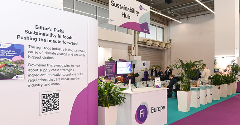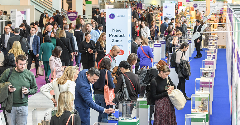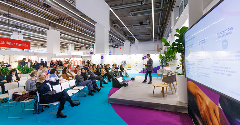News
Diabetic Breakfasts – A Key Focus of New Product Development
25 Jun 2013Almost 350 million people in the world have diabetes, and selecting the right foods to adequately manage the disease is a daily chore for many, particularly where breakfast is concerned. What is required are breakfast options for this demographic that are convenient as well as varied, while not forgetting that most diabetes sufferers live in […]

Almost 350 million people in the world have diabetes, and selecting the right foods to adequately manage the disease is a daily chore for many, particularly where breakfast is concerned. What is required are breakfast options for this demographic that are convenient as well as varied, while not forgetting that most diabetes sufferers live in low and middle-income countries.
Breakfast a challenge for diabetics
For diabetics, breakfast is the trickiest meal of the day. Mornings are usually the time when blood glucose levels are at their peak. Consuming a sugary breakfast cereal or other bakery products high in refined carbohydrates might just push them through the roof. Excess glucose in the blood, also referred to as hyperglycaemia, causes damage to the eyes, nerves and body organs.
Fortunately, the days when diabetics were given the blanket advice to restrict their carbohydrate intake to a bare minimum are long gone. What is important, as is now recognised, is to choose the ‘right’ carbohydrate foods – namely, complex ones with plenty of fibre and a low glycaemic index (GI), which help diabetes sufferers to keep their blood sugar levels on an even keel.
Wholegrain bakery products and cereals have benefited from this insight. Oats and oat-based porridge, in particular, whose content of beta-glucan (a type of soluble fibre) also helps to lower cholesterol, is often deemed the breakfast of choice for diabetics and people at risk from cardiovascular disease. Diabetes and cardiovascular disease go hand-in-hand as diabetes counts as a major predisposing factor.
Variety and convenience
But it cannot be all about porridge. Like all consumers, diabetics want choice as well as convenience, and the offer of RTE (ready to eat) breakfast cereals targeted at this growing demographic is starting to expand. In February 2013, Australian health food company Goodness Superfoods launched a new range of breakfast cereals, Digestive 1st, Heart 1st and Protein 1st, aimed at people concerned about diabetes and heart disease.
The products contain wholegrain barley flakes made with BARLEYmax, a grain developed by CSRIO, which possesses a low GI and contains double the dietary fibre of other grains. The company also offers Traditional Barley+Oats 1st and Quick Barley+Oats 1st, which also contain BARLEYmax.
Beans for breakfast?
One type of food that is constantly touted as being ideal for diabetics because of its low GI and high nutritional value is legumes. The sad reality, however, is that legumes are largely absent from the daily diets of people living in highly industrialised countries, and they certainly do not eat them for breakfast – except, perhaps, in the UK where baked beans constitute part of the “traditional English breakfast”. However, even though the concept of eating beans for breakfast may not be alien to Brits, it is far from a daily habit. Furthermore, standard baked beans are laden with added sugar and therefore not all that suitable for diabetics.
Probably the best way of getting people to consume legumes for breakfast is if they do not realise that they are eating them – at least from a sensory perspective. To this end, researchers from the University of Nigeria have developed an RTE breakfast cereal that incorporates the African yam bean, a legume lauded as beneficial for diabetics, but onerous to cook. The researchers found that a flour blend of 60% African yam bean and 40% maize achieved the optimum balance between efficacy and palatability.
According to the International Diabetes Federation, Nigeria is the leading African country in terms of diabetes incidence, with 3.2 million cases. Startlingly, four out of five diabetes sufferers live in developing countries, and the WHO points out that 80% of deaths from diabetes occur in low- and middle-income countries. Evidently, there is a rampantly growing need for convenient products that are both culturally acceptable and economically priced to be developed and marketed to cater for the burgeoning number of diabetics living in the world’s emerging economies.
Some of these items, and particularly those that might make a suitable breakfast, will – perhaps with slight modifications – also make it onto the supermarket shelves in industrialised countries. Legume-based RTE breakfast cereals definitely have potential in this regard.
Related news

Paris Olympics: Food and beverage brands champion health, fun, and sustainability
5 Aug 2024
Food and beverage brands are aligning with the Paris Olympics 2024 Food Vision, which emphasises sustainability, local sourcing, and plant-based diets.
Read more
Natural Remedies: Bringing health and happiness via validated branded ingredients
18 Apr 2024
Natural Remedies is an internationally renowned botanical healthcare company committed to advancing the field through rigorous research and the development of clinically validated Branded Ingredients. Guided by our foundational principle of ‘BEING USEF...
Read more
Exploring the future of health and wellness retail at Vitafoods Europe
14 Mar 2024
With retail-focussed content sessions, buyer networking, and finished product tasting sessions, this year’s Vitafoods Europe offers a not-to-be-missed opportunity for retailers to up their health and wellness game.
Read more
Sustainability meets innovation at Fi Europe 2023's Sustainability Ingredients Zone
9 Jan 2024
Fi Europe’s Sustainable Ingredients Zone showcases ingredients forging a path toward a greener future. Three innovators are redefining what sustainability within the food and beverage industry means, with upcycled products, regenerative agriculture, an...
Read more
Unleashing the power of plants at Fi Europe’s New Product Zone
5 Jan 2024
In the diverse landscape of plant-based innovation, Fi Europe 2023's New Product Zone spotlighted ten plant-based ingredients, tailored to meet the rising demand for sustainable and delicious options.
Read more
Meet the innovative ingredients showcased at Fi Europe’s New Product Zone
3 Jan 2024
The Food Ingredients category at Fi Europe’s New Product Zone featured 19 distinct and innovative products. From fermented delights to sustainable proteins, these ingredients are ready to make their mark in the market.
Read more
Fi Europe’s New Product Zone elevates the nutrition of everyday indulgences
22 Dec 2023
At Fi Europe 2023's New Product Zone, eight health ingredients, each offering an enhanced nutritional profile of various products, were on display. These ingredients address the evolving needs of the food and beverage industry and cater to consumers se...
Read more
Fi Europe’s New Product Zone explores fresh possibilities with five natural ingredients
20 Dec 2023
Fi Europe 2023's New Product Zone unveils five natural ingredients, each catering to the growing demand for clean products and embodying ethical and sustainable choices for today's conscious consumers.
Read more
Water-conscious consumers, upcycled food, and tech-driven sustainability: Highlights from Fi Europe, part 2
14 Dec 2023
With climate change becoming a tangible reality, consumers’ environmental concerns are changing. At Fi Europe, market analysts revealed how people are now interested in everyday issues like water shortages and tech-driven solutions such as GM drought-r...
Read more
The food industry’s single-use packaging problem
12 Dec 2023
The food industry’s reliance on single-use packaging is a sustainability “sticking point” with viable alternatives not widely available – but new EU rules mean food businesses will remain responsible for the collection and disposal of the packaging the...
Read more